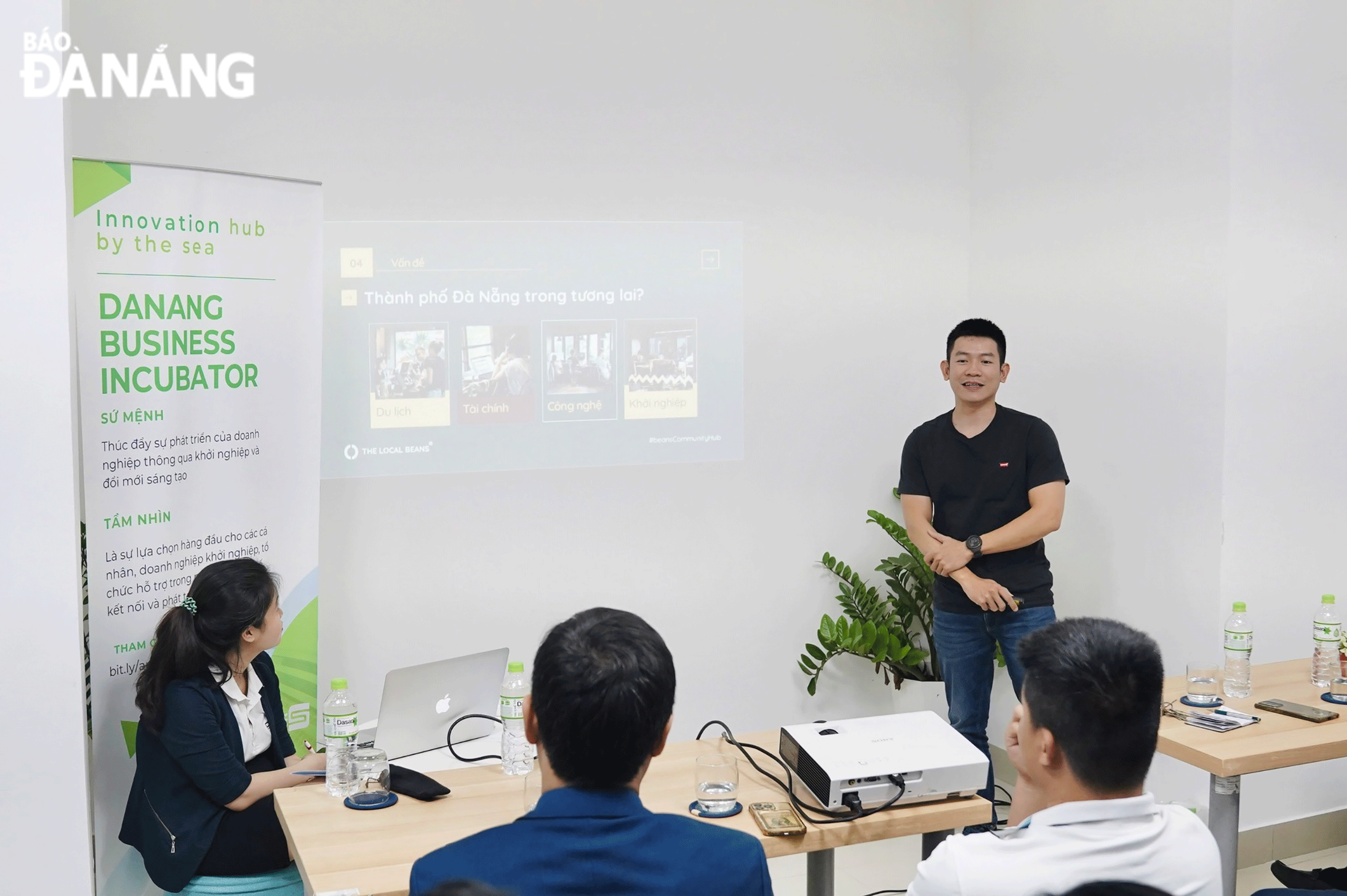What should incubators do to accelerate growth of startups after incubation?
Incubation programmes help many startups build and form appropriate development directions, and open up opportunities for them to boost market cooperation and promote brand development, thereby actively contributing to the development of the city's innovative startup ecosystem.
However, incubators need to roll out solutions to support the development and enhance the competitiveness of startups after incubation.
 |
| Incubators help many startups build and form appropriate development directions. IN PHOTO: A representative of a project under a DNES-organised incubation programme is discussing and sharing startup-related items. Photo: VH |
Many impressive results
Established in January 2016, the Da Nang Business Incubator (DNES) is the first public-private partnership model in the city.
With the mission of supporting startups to connect resources in the ecosystem towards sustainable development, DNES has implemented many support programmes and activities.
Specifically, the DNES-hosted FINC+ Interactive Startup Incubation programme has so far provided incubation support for over 90 startups/projects. A number of potential startups from the programme have called for investment capital of about US$25 million from investors and investment funds. Five of them have exported their products to international markets.
The aforementioned achievements are the theoretical and practical basis for DNES to upgrade the FINC programme into FINC+ version for more effective incubation.
Accordingly, DNES has boosted digital transformation, as well as designed and built a new version of FINC incubation programme, called FINC+, on an online platform in a bid to create space to increase interaction.
Also, the unit has applied technology in an effort to ensure scalability, and provide opportunities and access ability to incubation programmes for more startup projects in the ecosystem, hereby fulfilling the mission of universalising startup knowledge.
The FINC+ interactive incubation platform lasts for 4 months, helping startups practice and perfect their businesses, ready for the market access stage.
In 2023, DNES has incubated a number of startups such as FiveSS, Beans Community Hub, Xiro Tr'din, Fastdo, and Vigift.
In a similar vein, since late 2019, the Da Nang Hi-tech Park's General Service Centre under the Authority of municipal Hi-Tech Parks and Industrial Parks has been assigned by the local authorities to support high-technology incubation.
To date, the centre has supported 7 out of the 9 selected projects. During the incubation process, the projects have participated in training courses on improving knowledge about high-tech startups and innovation, especially the improvement of capacity on intellectual property, management, finance, and in-depth consulting with experts.
In addition, the centre has connected incubation projects with startup ecosystems, investors and investment funds at both home and abroad, as well as taken part in fairs, exhibitions, and companionship programmes.
Some projects have achieved some outstanding results after the incubation stage. Among them are the project on treatment and recycling of waste solar batteries sponsored with US$200,000 by the U.S.-ASEAN Smart Cities Partnership (USASCP) which is ranked as one of the top 6 projects in Asia receiving the highest level of funding; and the ‘Shipway - Smart Transportation’ project receiving VND300 million in funding from the municipal Department of Science and Technology.
Improvement of incubation quality
After many years of working with DNES, Mr. Nguyen Van Chuong, Manager of the Swiss EP Programme in Da Nang, stressed the necessity for incubators to synchronously take many solutions in a bid to build the innovative startup ecosystem as well as help new startups maintain operations and develop after the incubation process.
He pointed out that top priority should be given to providing support programmes suitable for each stage of startup development; diversifying forms of support such as consulting, training and connecting with investors; and developing specialised programmes for potential startup fields.
Mr. Chuong also underlined the must-do for incubators to attract and recruit a team of experts with extensive expertise and practical experience in each startup field to improve quality; strengthen connections with components in the startup ecosystem by coordinating with other startup organisations to create a comprehensive support ecosystem for startups; and organise networking events, and create favourable conditions for startups to join domestic and international startup networks.
Importance should be attached to developing startup capacity through the organisation of training programmes on necessary skills such as building business, corporate governance and capital raising models; providing consulting and mentoring services to support startups in solving problems during operations, building strategies for appropriate development and effective market access; and applying technology into incubation activities and building online connection platforms, he noted.
"In fact, incubators need strong support from local government and businesses in terms of funding and infrastructure to survive and develop sustainably", Mr. Chuong added.
Mr. Ly Dinh Quan, General Director of the Song Han Incubator Centre (Songhan Incubator) informed that, over the past 7 years, the Songhan Incubator has contributed to creating foundational value for the innovative startup ecosystem in Da Nang and Viet Nam in general.
The centre has mastered the knowledge system on innovative startups that can advise, transfer, and accompany service providers in implementing innovative startup activities; and diverse network of linked and cooperative resources with partners from ministries, branches, localities, universities, start-up support centres, socio-political organisations, associations, and international organsations, experts, investors, investment funds and a network of startups with more than 200 cooperation contacts.
“To support the ecosystem as well as help startups grow and develop after the incubation process, incubators need to join hands to build the local startup ecosystem and a network of mentors and investors in order to support startups to develop capacity, connect resources and develop domestic and international markets," Mr. Quan emphasised.
Reporting by VAN HOANG - Translating by M.DUNG